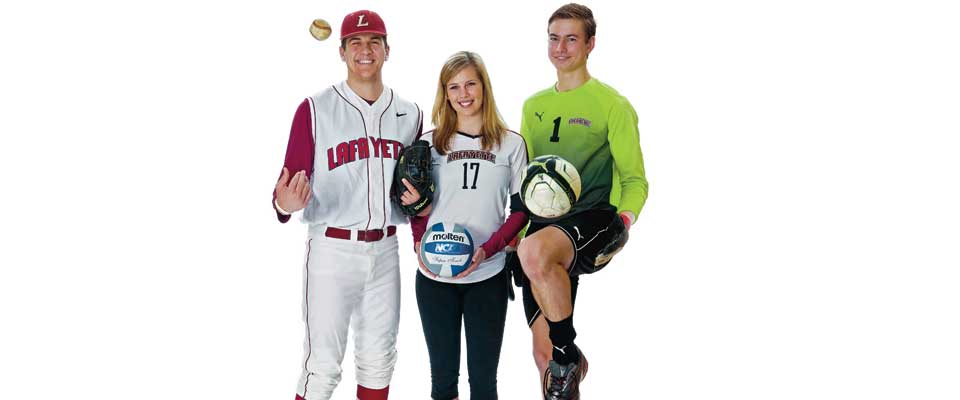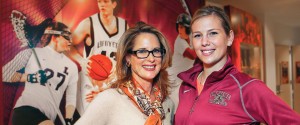
Mar 18, 2013
Academy Named in Honor of Oaks ’51
A family of captains endowed the Oaks Leadership Academy. Cynthia Oaks Linville ’80, captain of the 1980 women’s lacrosse team and current president…

Cory Spera ’15 (L-R), Sarah Frohnapfel ’13, and Nate McDonald ’14 are leaders on the field, in the classroom, and around campus.
by Benjamin Gleisser | photography by Ken White

Maroon Club president Cynthia Oaks Linville ’80, P’13 (left) and Sarah Frohnapfel ’13 were featured in an interview during halftime of the Lafayette Sports Network’s telecast of the women’s basketball game against Holy Cross Feb. 20. Photo by Chuck Zovko
Lessons learned in Oaks Leadership Academy sessions helped the soccer team win the Patriot League Championship last season, says Nate McDonald ’14. “In the past, we were inconsistent. We’d play well, but then if we lost a game we’d get mad and start pointing fingers. This year, we had an overarching vision to win, and I helped everyone stay focused. We were 11 guys thinking the same way.”
A mechanical engineering major, McDonald is contemplating a career in the aerospace industry.
He says the academy is about getting inspired. “It’s not just about leading a team, but looking at leadership in business and in other realms. Leadership starts with yourself and can carry over into academics—you know how to do the right thing, like prepping for tests. It can apply to your family life, and many decisions that you make.” McDonald is vice chairman of Athletes C.A.R.E., a new organization started last year through which athletes conduct food and clothing drives for those in need in the local community.
McDonald and 110 other student-athletes who participate in the program are well on their way to realizing their ambitions, thanks to lessons they’re learning about sports, academics, life, and themselves. Designed to develop Lafayette’s next generation of leaders, the academy inspires them to become spark plugs that ignite their teammates’ desires to succeed and, more important, encourages their own potential outside the sports arena.
“Oaks Leadership Academy helped me develop a list of skills that I now know are my strengths,” says Sarah Frohnapfel ’13, an English major and captain of the volleyball team. An outstanding and highly involved leader on campus, she is student government vice president and a member of the planning committee for the 2013 Lafayette Leadership Institute (see story on LLI).
“The program also taught me how to interact better with people,” she continues. “Before, I sometimes found it stressful to talk with coaches and my professors. Now, I feel more comfortable in those interactions. Plus, my friends feel like they can talk with me. They see me as someone who gives good advice and talks with a clear head.”
The Oaks Leadership Academy began in 2010, after Bruce McCutcheon, director of athletics, heard a presentation at Janssen Sports Leadership Center about the importance of developing leadership skills in student-athletes. Cynthia Oaks Linville ’80 and Judson Linville ’79 agreed to fund the program in honor of Cynthia’s father, Dr. William Oaks ’51.
The program has three steps: emerging leaders, during which sophomores learn the essentials of being effective role models; veteran leaders, which trains juniors to become vocal leaders; and leadership 360, during which seniors receive evaluations that help them discover their strengths. Coaches from the 23 varsity sports nominate sophomores who have the potential to be team captains to participate.
Students attend two workshops each year on topics such as conflict resolution, how to hold peers accountable when they miss practice, and what to say to teammates who drink or behave irresponsibly.
The program helps students develop their communication skills and their ability to gain respect from peers, says Kaity McKittrick, associate director of athletics, who oversees Oaks Leadership Academy.
“You get respect from the way you treat people, how you hold yourself, how you behave outside of the gym.” — SARAH FROHNAPFEL ’13
“Through role-playing skits and discussion, students learn motivational skills that they can use on the field and in their daily lives,” she says. “The self-confidence they develop can also be used in their study habits and later in situations like job interviews.”
Frohnapfel agrees that the training has wide application. “We learn how to confront teammates without being an enforcer. It’s hard to call people out, but they respond well if they respect you. If you treat them well, they’ll trust what you say because they know it’s for the betterment of the team. You get respect from the way you treat people, how you hold yourself, how you behave outside of the gym.”
Greg Shelley, a performance consultant associated with Janssen and an associate professor of sports psychology at Ithaca College, manages the program with McKittrick. “The program stresses the four C’s: confi dence, commitment, character, and composure,” he says. “Athletes at other schools who later went into the business world have written to say that the composure training they received really helped them in the boardroom and with negotiating a contract with team management.”
Besides the aerospace industry, McDonald is also contemplating playing soccer in Europe or going to law school. Frohnapfel, whose dream is to be athletic director at a university, got one step closer to her goal when she won a summer internship at the Patriot League Conference office.
A biology major, Cory Spera ’15 joined the academy this year. His goal is to become a doctor, and run his own medical clinic.
In addition to being a relief pitcher on the baseball team, Spera volunteers as a peer mentor and a Gateway ambassador. In both positions, he helps first-year students become acclimated to the demands of college. “I’m like a first friend on campus,” he says, “somebody they can talk to.”
Spera sees parallels between what he learns in the academy and his life. “It helps me make my own goals and see that in academic life, you have to get ready for a test the same way you’d prepare for a game.”
Surprised when head baseball coach Joe Kinney nominated him a year ago, Spera says that now he recognizes his leadership qualities—high commitment, high character, and high confidence. “I want to open my own clinic someday, so I’ll have to be a strong leader in order to be a good boss.”
Men’s soccer coach Dennis Bohn nominated McDonald for the program. Going from emerging leader to veteran leader means becoming a vocal leader.
“A vocal leader focuses on the team’s work ethic, and learns to develop relationships with each player,” says McDonald. “We praise players when they deserve it, and call out players when they need it. You have to learn who’s going to respond to a challenge and who’ll get upset with themselves. It’s similar to the way you learn to deal with people you meet in life.”
Three years ago, head volleyball coach Terri Campbell nominated Frohnapfel.
Seniors who have completed both previous steps undergo a 360-degree evaluation from those in their inner circle—teammates, coaches, and themselves. The goal: an assessment of their skills that details their strengths and suggests areas where improvement is needed.
Frohnapfel found the evaluations “extremely valuable” and was surprised to fi nd that out of all of them, the lowest score was her self-evaluation. “I was my harshest critic,” she says with a laugh.
Greg Shelley says Frohnapfel’s self-assessment is not uncommon. “A lot of the best leaders are humble. They’re not satisfied with themselves, so they don’t rate themselves as highly because they’re always striving to be better.”